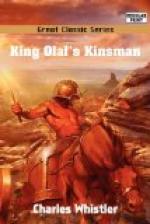“Let him go,” he said. “Maybe he will like best to win his own city without my help at the first onset. Yet unless that fort is weaker than it looks, his attack will be of no use. For, see—all the Danes from the bridge are going to help.”
So it was, and from the deck of Olaf’s ship I looked on at the fight for half an hour. At one time I thought that we had won the place, for our men charged valiantly through the moat and up the steep sides of the earthworks.
There waited for them the Danish axes, and an axeman behind a wall is equal to two men below him.
I longed to be beside Eadmund, whom I could see now and then, and ever where the fighting was fiercest; but Olaf bade me be patient. There would be fighting enough for me presently, he said.
“You will see that we shall have to take the bridge, and so cut the Danish force in two. Then from the bridge we have but to fight our way either into the fort or into the town.”
Presently our men gave back. The earthworks were too strong for them. Then I asked again that I might go.
“If you must fall, it shall be at my side, cousin,” said Olaf, laying his hand on my arm. “Eadmund does not need you.”
For now he and his men were coming back to the ships, having won nought but knowledge of the strength of the fort. The Danes would not leave their walls to follow the retreating English, though Eadmund halted just beyond bow shot, and waited as if to challenge them to fight in the open.
Now by this time the tide was almost full, and the stream of the flood was slackening. And it seemed as if one might easily scale the bulwarks of the great low-timbered bridge from the foredeck of a ship. Ethelred saw that, and as soon as his men were on board again the word was passed that attack on the bridge should be made by every vessel that could reach it.
As it fell out, we of Olaf’s eight ships lay below the rest, and must have passed them to reach the bridge. All we might do, therefore, was to close up to the sterns of the vessels that were leading, and wait to send our men across their decks when the time came. That pleased not Olaf at first, for he thought that his turn had come; but in the end it was well for us.
Now the ships slipped their cables, and drifted up to the bridge steadily, with a few oars going aft to guide them, and as they came the Danes crowded above them, manning their towers and lining the whole long length with savage faces and gleaming weapons. They howled at us as we drew near, and as the bows of the leading ships almost touched the piles, they hove grappling irons into them from above, holding them fast. Whereat Eadmund thanked them for saving trouble, while the arrows fell round him like hail.
But in a moment that word of his was changed, for now fell from towers and bulwarks a fearsome rain of heavy darts and javelins, and the men fell back from the crowded fore decks to seek safety aft until the store of weapons was spent. Truly, there must have been sheaves of throwing weapons piled ready on the roadway of the bridge.




